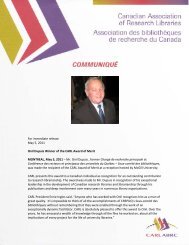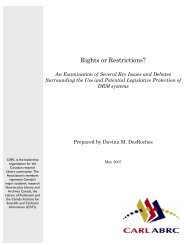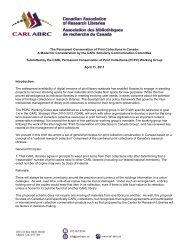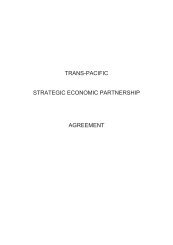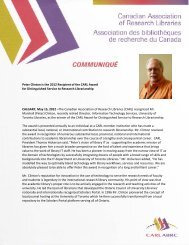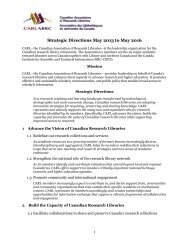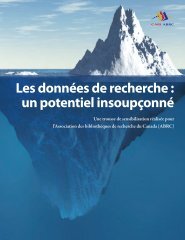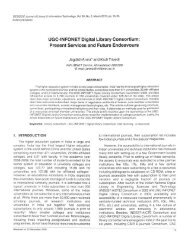PDF - CARL - ABRC
PDF - CARL - ABRC
PDF - CARL - ABRC
Create successful ePaper yourself
Turn your PDF publications into a flip-book with our unique Google optimized e-Paper software.
archive to ensure perpetual access. As well, creating and maintaining a<br />
digital archive entails ongoing commitments to migrating digital<br />
content through any changes in technology to sustain full access.<br />
Publisher-based collections are the most common digital archives<br />
model; libraries subscribe to digitized backfiles and the publisher<br />
undertakes responsibility for maintaining the content of, and access<br />
to, those backfiles. McKinzie notes, however, that reliance on vendor<br />
archiving is dubious as it is dependent on the solubility of a<br />
company. 52 The last decade has seen the merging of major publishers<br />
for economic reasons. Sadie Honey comments more specifically on the<br />
lack of financial motivation for publishers, as “expenditure[s] made by<br />
a publisher must be covered by the expected profits. If print content is<br />
no longer of commercial use to the owner of that content, then there is<br />
a loss of motivation on the part of the owner to maintain that<br />
content… Given the added expense of upgrading content to new<br />
formats as technology advances, they cannot be relied upon to<br />
maintain the collection of their back issues electronically either.” 53<br />
The legal and market pressures publishers face also contribute to<br />
the unpredictability of publisher-based digital archives. Publishers<br />
may pull content from archives for financial or legal reasons. 54 There<br />
are cases in which journals have been withdrawn from existing<br />
electronic packages, or else have come very close to being withdrawn.<br />
For example, in 2007 the American Association for the Advancement<br />
of Science (AAAS) announced plans to stop providing the journal<br />
Science to JSTOR. Instead, the nonprofit publisher would do its own<br />
digitizing, and sell subscriptions to the electronic content itself. AAAS<br />
chief executive Alan I. Leshner commented that “it makes more sense<br />
to control our own archive than to fundamentally give it away for<br />
free.” 55 Although AAAS later buckled to pressure from library<br />
consortia and stayed with JSTOR, this case remains an example of<br />
publishers wanting to regain control of back issues and, as a result,<br />
causing uncertainty for libraries on what e-content they own, as well<br />
as the stability of that content. 56<br />
The uncertainties and complexities of establishing and maintaining<br />
digital repositories further complicate the question of whether<br />
and how to develop and maintain a last-copy/low-use storage facility<br />
for print collections. Academic libraries may recognize the value in<br />
working together to establish a collaborative last-copy/low-use print<br />
repository solution but the myriad of issues involved make it difficult<br />
to know how and where to begin.<br />
ACONSORTIAL CASE STUDY: THE ONTARIO COUNCIL<br />
OF UNIVERSITY LIBRARIES<br />
The Ontario Council of University Libraries (OCUL) is a consortium of<br />
20 university libraries in the vast province of Ontario, Canada. The<br />
member libraries cooperate to enhance information services through<br />
collective purchasing (mainly of digital content), a shared infrastructure<br />
for digital access and services, document delivery, and many<br />
other similar activities. The sizes of the member institutions range<br />
from roughly 2000 full-time equivalent (fte) registered students up to<br />
66,000, delivering various combinations of undergraduate, professional,<br />
and graduate programs. Currently, there are five print storage<br />
facilities in operation, servicing seven OCUL institutions. The<br />
University of Toronto, the University of Western Ontario, the<br />
University of Ottawa, and Carleton University each have their own<br />
facilities. As noted earlier, Guelph, Waterloo, and Wilfrid Laurier share<br />
storage as members of the Tri-University Group.<br />
Scholars Portal is an infrastructure developed by OCUL to manage<br />
and deliver digital resources and services to member institutions'<br />
380,000 students and researchers. 57 Scholars Portal is housed at the<br />
University of Toronto, where several staff members monitor its<br />
growing array of content and services. One key element of Scholars<br />
Portal is the loading of many full-text journals and books – as well as<br />
indexes and abstracts – on local servers. Member institutions access<br />
this locally-loaded content via servers at the University of Toronto<br />
rather than through individual publishers' sites. A key current<br />
initiative for OCUL is to bring Scholars Portal into conformance with<br />
emerging standards for trusted digital repositories so that it can meet<br />
the OCLC standard of providing “reliable, long-term access to<br />
managed digital resources to its designated community, now and in<br />
the future.” 58<br />
OCUL library directors questioned the value of maintaining<br />
collections of print holdings duplicated by digital content. This was<br />
prompted by the increasing popularity of digital forms of scholarly<br />
communication, pressure to re-tool buildings and facilities to<br />
accommodate user needs, and Scholars Portal's offering reliable<br />
long-term storage and access for consortium digital resources.<br />
Surveying Members<br />
In 2008 OCUL undertook a survey of its members to determine<br />
what the members were doing, if anything, with respect to reevaluating<br />
their print collection footprints, the reasons for the reevaluation,<br />
their views on the need for a consortial print collection<br />
storage solution and what form that solution might take. The review<br />
took the form of in-depth interviews with the directors of each<br />
institution. 59 The questions asked of each director were:<br />
1. Do you see the need for an archive of published research materials<br />
(print and/or electronic) in Canada?<br />
2. Do you see the need for an Ontario archive?<br />
3. Is it a priority that Scholars Portal be developed to the standard of<br />
a recognized trusted digital repository?<br />
4. Do you need to retain a last print copy of all e-journals in Scholars<br />
Portal?<br />
5. What are your priorities with respect to print repository<br />
development?<br />
“In 2008 OCUL [Ontario Council of University<br />
Libraries] undertook a survey of its members to<br />
determine what the members were doing, if<br />
anything, with respect to re-evaluating their<br />
print collection footprints, the reasons for the<br />
re-evaluation, their views on the need for a<br />
consortial print collection storage solution and<br />
what form that solution might take.”<br />
The interview discussions were free-flowing, directed along the<br />
general lines of the five questions but open to pursuit of tangents and<br />
other questions that came up during the interview. Some interviews<br />
took place with the director alone; other interviews were with a<br />
group of individuals (the director and others invited by the director).<br />
There were 20 interviews, one at each OCUL institution. The<br />
interviews were recorded and loosely transcribed to discern patterns,<br />
common opinions, and areas of contention. To aid in data analysis<br />
each institution was assigned to a size category based on fte for the<br />
institution. The categories were: VL, “very large” (n=4, N30,000 fte);<br />
L, “large” (n=6, 20,000–30,000 fte); M, “medium” (n=3, 10,000–<br />
20,000 fte); and S, “small” (n=7, b10,000 fte).<br />
RESULTS<br />
The interviews revealed a wide range of opinions with six main<br />
themes emerging: 1. the nature of library as a place is changing; 2.<br />
May 2010 245



